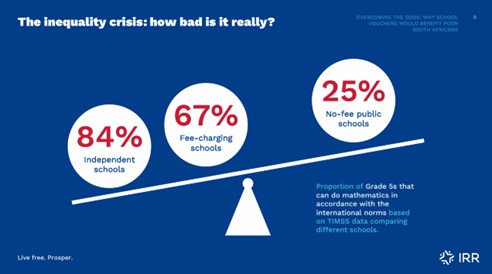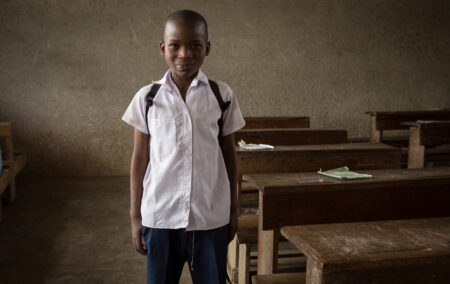The time for an unequal education system must come to an end. With a new minister in charge of basic education for the first time in fifteen years, the relationship between the sector, parents, and unions must be turned on its head if we are to see the next generation of South African children succeed.
You’ve heard the following statistics before, but it is worth hearing them again – and knowing that these aren’t just statistics – they are a representation of the horrific damage the education system; the curriculum, teachers, principals, and unions have unleashed on South African children.
- South Africa is 75th out of 76 nations in Maths & Science tests,
- South Africa’s Grade 5s ranked 62 out of 64 in Maths & Science tests,
- 81% of Grade 4 students cannot read for meaning, and
- 31.8% of Grade 10s dropped out before writing the National Senior Certificate.
This is an even more pressing issue with the news that the Western Cape Department of Education is planning to cut more than 2,400 teaching posts. In KwaZulu-Natal it is even worse, with 11,000 teaching posts in danger.
The Western Cape Government blames the 2023 “nationally negotiated” wage agreement that has resulted in budget cuts affecting the core of service delivery: healthcare and education. The circular notes that the Department is facing a R3.8 billion shortfall over the next 3 years.
As is commonplace in South Africa, the unions are upset. Parents, too. Who wouldn’t be?
This is the consequence of the ANC’s continued fiscal mismanagement and 15 years of mediocre leadership at the Department of Basic Education (DBE):
According to the DBE, the number of public-school pupils not paying school fees has increased by 50% between 2009 and 2021.
The real crisis
The phenomenon of ANC misdiagnosis continues, as it misses the real problem in South African schools: the lack of qualified, competent foundation-phase teachers. In 2018, the Department of Monitoring, Planning, and Evaluation found that only five out of 22 teachers could successfully identify the main idea in a paragraph. Arithmetic skills were equally bad, with six out of the 22 teachers able to express 0.4 as a fraction.
Unions
Discussing the education and schooling sector without mentioning the South African Democratic Teachers Union (SADTU) wouldn’t do the problems the sector faces any justice.
In 2016 the Minister of Basic Education, Angie Motshekga, instituted an investigation into allegations of the “selling of posts by members of teachers’ unions and departmental officials in provincial education departments”. The report found, among other things, that the ANC-aligned SADTU was in de facto control of six provincial education departments. The report concludes that “it is not improbable to say that schooling in South Africa is run by SADTU”.
The education department let SADTU loose on the education system and children, irreversibly damaging their prospect of a successful future. It comes as no surprise that the union opposed Siviwe Gwarube’s appointment as Minister. It could also be a tacit admission from the ANC that it is fed up with SADTU’s antics.

BELA Bill
The solution to SA’s education problems is not the Basic Education Laws Amendment (BELA) Bill championed by among others, Gauteng Premier Panyaza Lesufi. The BELA Bill seeks, among other things, to upend the practice of allowing School Governing Bodies (SGBs) to determine admissions and language policies, as well as removing SGB powers only to centralise the power in the hands of unelected Heads of Departments.
In 2022, I called the BELA Bill the “ultimate tool in breaking down the longstanding relationship between provincial departments and SGBs”. As is the ANC norm, centralising power in pursuit of the National Democratic Revolution again trumps democratically elected SGBs and the needs of children who attend public schools.
The BELA Bill does not address key issues in basic education, particularly poor infrastructure and the lack of support for learners who, because of schooling deficiencies, struggle to understand key concepts at a primary school level. The widespread lack of textbooks, for example, hinders the development of skills such as critical thinking. Another problem is insufficient recognition of the importance of early childhood development, and conditions that create a stable home life for young South Africans.
A national asset or liability?
The DBE’s slogan “every child is a national asset” rings hollow when one considers everything children need to go through to access schooling. Whether it is crossing rivers about to burst their banks, being taught under a tree in the hot African sun, risking the danger of falling into a pit toilet or sharing a classroom with 89 other learners, it is clear that primary education in South Africa is one catastrophic and generational mess that will endure long into the future.
Nelson Mandela famously said, “education is the most powerful weapon to change the world”. If South Africa is to make his words become a reality, getting the education sector on the path to #WhatSACanBe is the only way to improve. School vouchers will give parents the freedom to choose the best available school for their children, whether it is public or private. This incentivises competition for the vouchers and can help weed out underperforming schools. It also incentivises involvement through SGBs, which the BELA Bill seeks to defang.
This is #WhatSACanBe.
Read the latest paper here.
[Image: https://www.pikist.com/free-photo-srjrt/download]
If you like what you have just read, support the Daily Friend


